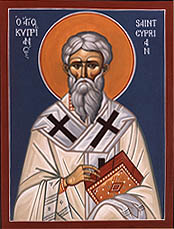Cyprian of Carthage
Hieromartyr Cyprian of Carthage was the leading bishop of the Church of Africa during the mid-third century. He was martyred during the persecution of emperor Valerian. His feast day is August 31.
Life
The early life of Thascius Caecilius Cyprianus is largely unknown except that information from his writings. The date of his birth is unknown but is believed to be about 200 in Carthage. He came from an eminent non-Christian family, apparently of some wealth. He was well educated in rhetoric. He came to Christianity after finding himself disgusted with the ostentatious wealth, corrupt justice, and a society of bloodthirstiness and cruelty. During his journey to Christianity, he was guided by his friend, the priest Cecilius. He found that through the experience of baptism he was liberated and cleansed from his old life and given a new birth, armed with the heavenly gift of the Holy Spirit.
When he was baptized is unknown as are the dates he became a deacon or priest. Near the end of 248, after the death of Bp. Donatus of Carthage, he was chosen, by the voice of the people, bishop of Carthage with opposition from a small group elderly Carthaginian presbyters including Novatus who would cause him problems later.
Before Cyprian was bishop a year the persecutions of Decius began, as Decius required all citizens to sacrifice to the state gods and be in receipt of a libellus, a certificate from a temple confirming the act. As the bishops of the church immediately became targets of the decree, Cyprian found a safe place from which he was able to maintain his charge of the church in the province of Africa through correspondence, relying on faithful workers such as his friend Tertullus.
After the death of Bp. Fabian of Rome, the priests and deacon who were over seeing the church in Rome criticized Cyprian from going into hiding. Cyprian, in return, replied to them about his activities, sending as proof copies of the correspondence with the churches of Carthage, noting that his presence in Carthage would only provoke the Roman authorities and aggravate the persecutions.
As the persecutions continued the issue that had arisen in the church in Rome concerning treatment of the backsliders (lapsi) appeared in Carthage, raised by Novatus and his supporters. Cyprian, following the general approach of Rome, gave a more precise approach that pastoral care would be given to the backsliders while the persecutions continued, leaving the decision of receiving them back into the fellowship of the church to a synod after the persecutions ended.
In 251, Cyprian called a local council that decreed that it was possible to receive the lapsed back into the church after a penance. In the meantime, the priest Novatus joined with a priest of Rome, Novatian, in a schism of the church by asserting that those who lapsed during the persecution could not be readmitted even if they repented their sin. In Carthage, Fortunatus, who opposed absolution, was elected by Cyprian's opponents as bishop of Carthage. Further, Novatian, aided by Novatus, convinced three Roman bishops to place Novatian on the cathedra of Rome while Bp. Cornelius still occupied it. Cyprian entered the battle with a series of encyclicals to the African bishops that was later produced as the book, On the Unity of the Church. Support for the extreme measures by those who opposed absolution were moderated by Bp. Cyprian's writings raising him in the eyes of the people and increased further by their witness of his self-denying devotion during a great plague and famine that descended on Africa.
In 256, a new persecution arose under emperor Valerian in which the Roman bishops Stephen I and Sixtus II were martyred in Rome. After preparing his people for the extension of the persecution to Africa with his De exhortatione martyrii, Bp. Cyprian set himself as an example when he was brought before the Roman proconsul Aspasius Patermus on August 30, 257, by refusing to sacrifice to the pagan gods and firmly professed Christ.
Exiled to Curubis, today's Korba Tunisia, Cyprian comforted, as best he could, those of his exiled flock and clergy. A year later, he was returned and kept prisoner in his own villa as a more stringent imperial edict was issued that demanded execution of all Christian clergy.
He was imprisoned on September 13, 258 at the order of the proconsul, Galerius Maximus. The following day he was questioned again and then sentenced to die by the sword, to which he answered "thanks be to God!" The execution came in an open place near the city before a multitude that followed Cyprian on his last journey. After removing his garments without assistance, he knelt down and prayed. After he blindfolded himself, he was beheaded by the sword on September 14, 258.
| Cyprian of Carthage | ||
|---|---|---|
| Preceded by: Donatus |
Bishop of Carthage 248-258 |
Succeeded by: ? |
Sources
- OCA: Hieromartyr Cyprian the Bishop of Carthage
- Wikipedia: Cyprian
- H. Lietzmann, A History of the Early Church, tr. Bertram Lee Woolf, Meridian Books, The World Publishing Company, Cleveland and New York, 1961, Vol II, pp225-238,
External links
Categories > Church History
Categories > Church History
Categories > Church History
Categories > Church History
Categories > Liturgics > Feasts
Categories > Liturgics > Feasts
Categories > Liturgics > Feasts
Categories > Liturgics > Feasts
Categories > People > Clergy > Bishops
Categories > People > Clergy > Bishops > Bishops by century > 3rd-century bishops
Categories > People > Clergy > Bishops > Bishops by city > Bishops of Carthage
Categories > People > Saints
Categories > People > Saints > Ante-Nicene Saints
Categories > People > Saints > Martyrs
Categories > People > Saints > Saints by century > 3rd-century saints
